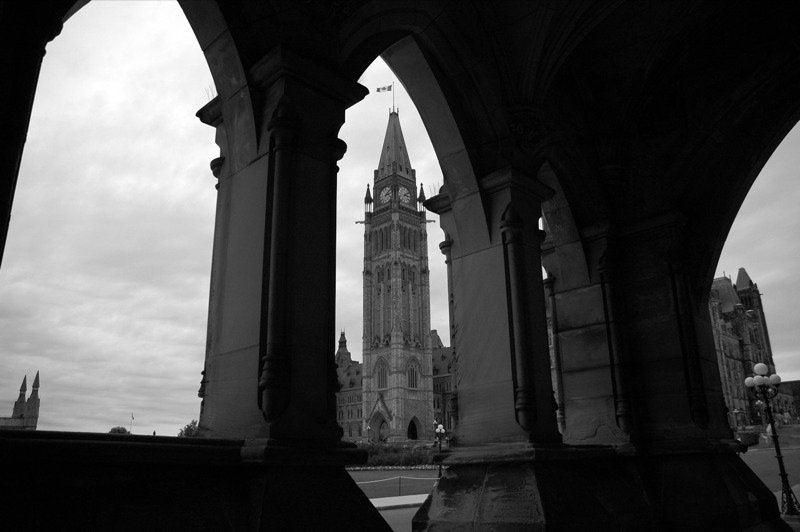I suspect that the events of October 22, 2014 will mark a turning point in Canadian civil liberties.
With downtown Ottawa slowly emerging from lockdown and thousands of people who work in the core reeling, we are far from the dust settling on what has just happened.
I also suspect that despite this fact, there are some who are already planning how to use these events to justify certain political policies.
I was not afraid when I heard the news. I’m 500 kilometres from Ottawa and, despite living in a military city, where seeing uniformed soldiers and armored vehicles is the norm, my first reaction was not fear.
I felt a deep sense of tragedy. I felt worry for the many friends I have who work on the Hill. I’m still nauseous.
Now, fear has started to sink in as well.
My fear doesn’t stem from the worry that I might die from a gun-toting man. Indeed, as a woman, those kinds of fears are pretty normalized over the activities of daily life. No, I’m deeply afraid of what today’s attacks in Ottawa will mean for civil liberties, our freedoms guaranteed by the Charter of Rights and Freedoms and our ability to speak out and criticize the actions of our government.
Canada went to war in Iraq with very little debate on the subject. In fact, Canadian personnel were dispatched to Iraq before a debate was held. When a debate was held it was quick and mostly ceremonial.
Canadian Air Force personnel were sent from Cold Lake, Alberta yesterday. They will engage in an aerial bombing campaign that will kill hundreds of people. It is likely that they will kill civilians. Despite near-unanimous consensus that ISIS is a threat that needs to be stopped, this fact should concern all Canadians.
As a result of our involvement in Iraq, there have been threats made against the safety of Canadian soldiers in Canada. Two days ago, someone who apparently supported ISIS, killed a soldier in St-Jean-sur-Richelieu.
This morning, a shooter ran through Centre Block while some journalists were in a scrum with Steven Blaney, Minister of Public Safety talking about changing measures to address Canada’s new heightened terror level.
This afternoon, there was supposed to be a debate on Canada’s gun laws, laws that the Conservative government is trying to loosen. Journalists have reported that at least one shooter used a long gun, the kind of gun that was subject to the gun registry, which the Conservatives cancelled.
If history tells us anything, Conservative forces are going to use this event to further restrict civil liberties. And maybe limited civil liberties should be limited. While this isn’t a view that I hold, Canadians should at least be able to have a public debate on the matter. We will enter a period of political disorientation. Canadians, and the NDP, need to do what they can to resist government attempts to limit debate on these matters.
Today’s events demonstrate the importance of public debate. Stephen Harper committed Canada to go to war in Iraq before holding a debate; before we had the opportunity to balance the dangers with the mission’s goals. When we go to war, we say that we’re willing to put soldiers into harm’s way. We say that we will support them when they return, or support their families if the worst-case scenario were to emerge.
War is dangerous and terrible business. Declaring war against another nation or political faction like ISIS cannot be done on the whim of a political party, especially as it will result in threats to Canadian life. We can only have these kinds of discussions when we encourage open and public debate.
We also need to examine how social and economic policies help to breed extremism. When public services are cut, people who are struggling with the effects of social isolationism cannot access the help that they need. When parents and friends contact police to say that they’re concerned about their loved ones, like was the case with the suspect in St-Jean-sur-Richelieu, there is little that can be done before anything illegal happens.
Of the 90 individuals that the RCMP has said they’re surveying as possible terror threats, do any of them have free access to a professional person (social worker, psychiatrist etc.) who can help guide them away from violence, without fear of having their words used against them in court? What kind of supports are they being given to help them disassociate themselves from violent ideology?
Or, are we just waiting for them to break the law so that we can lock them up?
Naomi Klein’s Shock Doctrine theory, that extreme measures can be imposed on people who would otherwise not consent in times of crisis, may give us a glimpse into the future.
For the North American left and Muslims in general, September 11, 2001 changed everything. Many people saw their civil liberties vanish. Many people were unjustly jailed.
Canada participated in the invasion of Afghanistan, ostensibly as a response to the attacks on the World Trade Centre; a military involvement that only ended this year. Social movements, especially the anti-war movement, were crushed. In many ways, social movements haven’t recovered.
In an era where many right-wing personalities and politicians regularly call social justice activists terrorists, we are potentially entering some very difficult times for state security and surveillance. In striving to capture people who are marked as potential terrorists, how many innocent people will be swept up?
Canadians need to take to the streets. We need to stand up to the culture of fear that events like today’s breed. We need to condemn violence and we need to offer supports to people who are directly affected by tragic events.
We need to reject the politics of division and re-inject the love and social solidarity that has been eroded from within our communities.
Photo: Darcy Knoll/flickr



